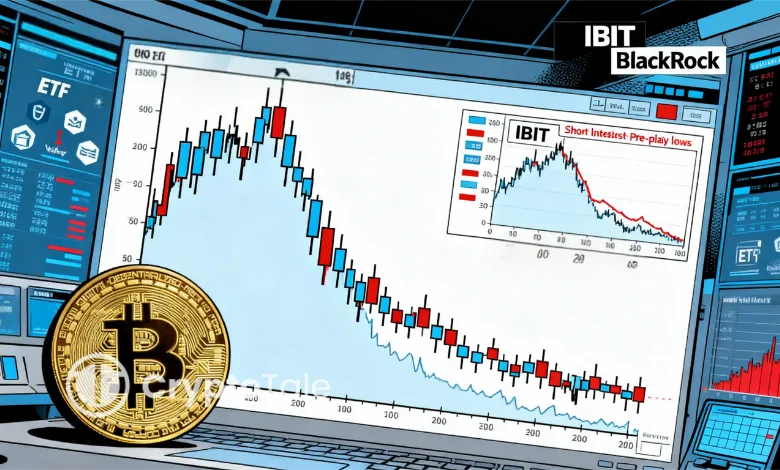IBIT Shorts Drop as Institutions Reset Bitcoin ETF Positions

- IBIT short interest plunged to pre-April levels as hedge unwinding defined the moves.
- Heavy Bitcoin ETF redemptions showed intensified selling pressure across major funds.
- Institutions shifted to neutral stances as outflows rose and Bitcoin got monthly losses.
Bloomberg analyst Eric Balchunas said IBIT short interest ‘plummeted’ this week, citing S3 Partners data that shows positioning falling back toward April lows. Analysts say the move looks like traders covering hedges rather than placing new bearish bets.
Short Interest Collapse and Hedge Adjustments
Balchunas stated that IBIT short interest fell from roughly 2% of outstanding shares to a fraction of that figure. According to S3 Partners, traders usually short into strength and cover during downturns. However, this pattern resurfaced as traders reduced exposure while Bitcoin continued its monthly slide.
He clarified that IBIT shorts never reached extreme levels, yet the speed of the drop stood out clearly. Notably, Balchunas explained that the activity pointed to hedge removals rather than new directional bets. Therefore, the reset placed positioning near levels seen before April’s prior rally phase.
While addressing future performance, Balchunas stated he could not predict outcomes. However, he referenced IBIT’s history of recovering from sharp downturns and returning to fresh highs.
To understand the background, Bitcoin previously fell from $109,000 in January to around $75,000 during early April tensions. Short interest also eased at that time before Bitcoin later recovered above $112,000.
Heavy Outflows Intensify Pressure on Crypto ETFs
Meanwhile, broader market data revealed strong redemption activity across crypto investment products. Global crypto ETPs recorded $1.9 billion in net outflows last week alone. U.S. spot Bitcoin ETFs represented $1.2 billion of those outflows, led heavily by IBIT.
IBIT alone registered nearly $1.1 billion in redemptions during the recent wave. In addition, November figures from Bloomberg showed $3.5 billion exiting U.S.-listed Bitcoin ETFs. This brought activity close to February’s record $3.6 billion monthly outflow.
BlackRock’s fund, which holds roughly 60% of total ETF assets, posted $2.2 billion in redemptions during November. This marked its worst month since its early 2024 launch.
Lookonchain reported daily updates showing net Bitcoin ETF outflows of 2,588 BTC. Within that total, BlackRock accounted for 1,452 BTC in withdrawals. These figures showed persistent selling pressure alongside declining short interest.
Related: Bitcoin Drop Deepens With Heavy ETF Outflows and Market Fear
Falling Shorts and Institutional Repositioning
However, the reduction in short exposure revealed a clear change in trading posture. Traders moved toward neutral positioning as bearish pressure started. Therefore, reduced short volume aligned with institutions stepping away from aggressive downside defense.
This month’s retreat also coincided with Bitcoin recording its worst monthly performance since the 2022 industry collapse. Notably, the ETF market showed a downturn through reduced short positioning.
The timing resembles April’s correction, when similar short resets occurred before renewed price movement. Still, current figures show sustained selling rather than a fast recovery. Therefore, traders continue reacting to price pressure and broader liquidity stress.
The broader sector continued changing as large funds adjusted risk exposure methodically. Therefore, the balance between outflows and lighter short-term activity became more visible. This structure shows how institutions have navigated Bitcoin ETF volatility.
IBIT short interest dropping to pre-April levels, combined with record redemptions, indicates deliberate hedge unwinding and careful repositioning by institutions. Outflows, declining Bitcoin prices, and steady short-term reductions reflect controlled responses rather than aggressive trading expansion. These developments outline a market resetting exposure while managing sustained selling pressure.




